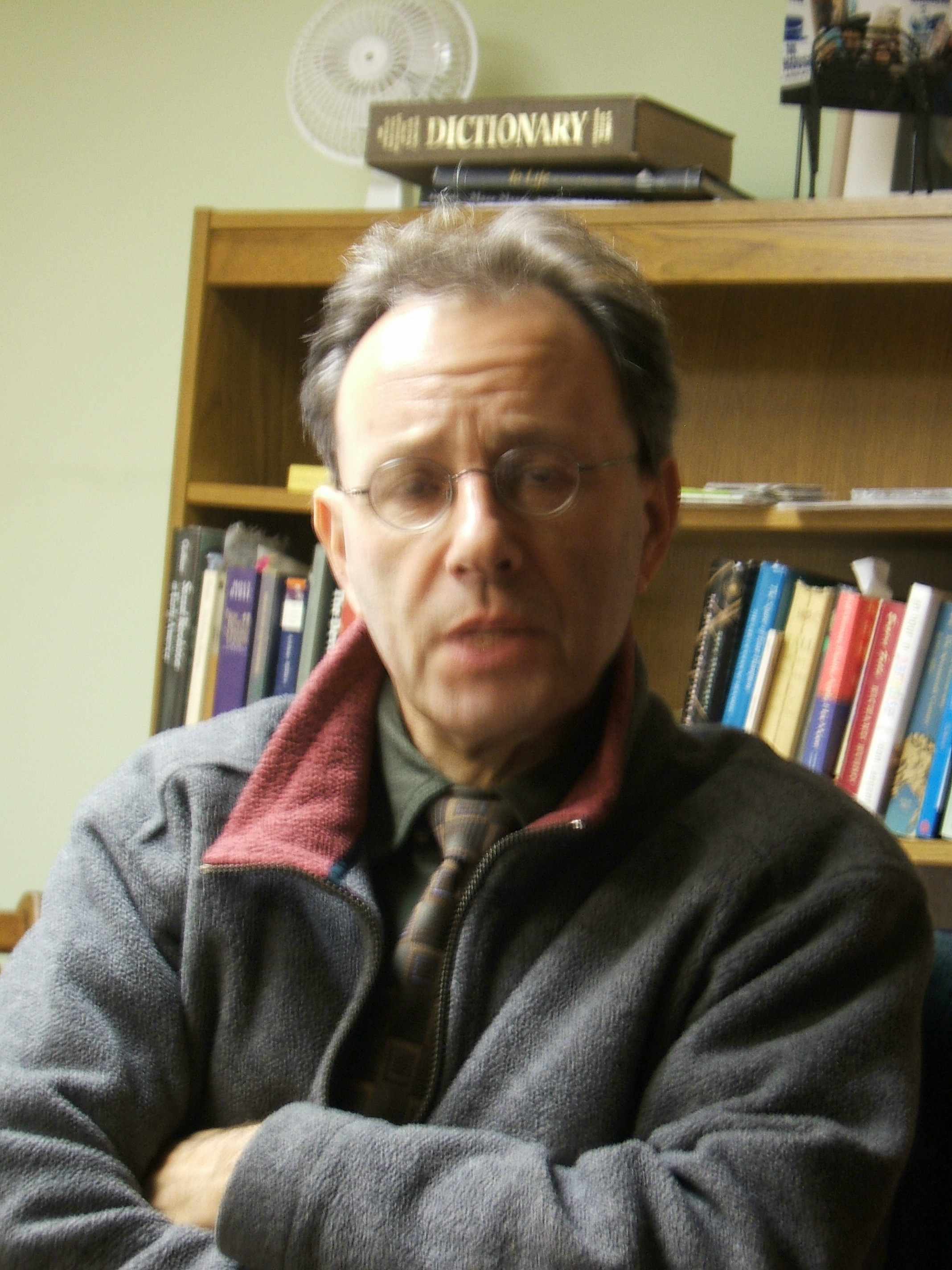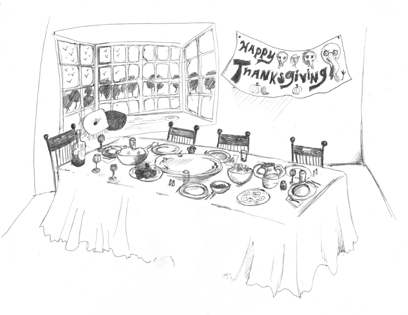 The conclusion of New Haven novelist and playwright Allan Appel’s four-part holiday serial. Today, Terence’s oratory, leadership, and remarkable political candor reach their height, leading the turkey nation —”- and us — into a future perhaps without Thanksgiving.
The conclusion of New Haven novelist and playwright Allan Appel’s four-part holiday serial. Today, Terence’s oratory, leadership, and remarkable political candor reach their height, leading the turkey nation —”- and us — into a future perhaps without Thanksgiving.
- * * *
 Yes, why should I not become president of this great country? I am born here, I am over thirty-five years of age, and I have committed no felony. For surely to have fled the turkey farm, where my life and that of my family was daily threatened, is no crime, no misdemeanor, but rather an act of simple self-defense. I contend, therefore, that I am eligible, under law, to be your President, and I ask you to consider all that has been said in this campaign, to judge me not by my plumage but by my positions on the issues, and then, on Tuesday, to give me your vote …
Yes, why should I not become president of this great country? I am born here, I am over thirty-five years of age, and I have committed no felony. For surely to have fled the turkey farm, where my life and that of my family was daily threatened, is no crime, no misdemeanor, but rather an act of simple self-defense. I contend, therefore, that I am eligible, under law, to be your President, and I ask you to consider all that has been said in this campaign, to judge me not by my plumage but by my positions on the issues, and then, on Tuesday, to give me your vote …
But Terence never delivered a word of his speech. To his great horror, as the lights and cameras went on that night, as the lenses zoomed in on him, all that came out of his mouth was “gobble, gobble, turk-turk, gobble, gobble.” On national television Terence’s features became dramatically more fowl-like. In spite of every effort to summon resistance to it and to speak with the simplicity and eloquence that had been his gift for years now, the metamorphosis continued. In front of millions of viewers Terence could only cluck and peck unintelligibly into the microphone. Two days later, Terence, who was by then in hiding, lost the election. He made no concession speech, and no reporter could even locate him. Days went by and no word from Terence. Gradually people turned their attention to thoughts of the upcoming Thanksgiving holiday. As the holiday approached, a remarkable series of reports began to filter into Washington from turkey farms around the nation. The turkeys were all refusing their feed. They were behaving in a most peculiar manner, as if they suddenly knew, all of them, the hundreds of thousands of them, that Thanksgiving was rapidly upon them. Their skittishness, the gnawing of their beaks around restraining fence wire, and even the occasional attacks by young turkeys on human beings could not be explained by any of the turkey farmers or animal husbandry experts summoned. Farmer Ed, who, after the election, was rumored to be in line for an assistant undersecretary-ship of agriculture, had no comment when reached by telephone. Three days before the holiday, turkeys by the thousands began digging under their fences, or leaping over the wires, using their wings to bound out of their enclosures. Reports of massive disappearances of the fattened birds were confirmed, and these only increased as the Thanksgiving feast neared. Parties out in search of the escaped birds could find nothing. No trace, as if the turkeys, like Terence, had disappeared out of the barnyards and farms and simply off the face of the continent. As one science fiction wag observed, perhaps they had fled back into the mythical New England forests and wildernesses of pre-Thanksgiving times. That fourth Thursday in November was America’s first Thanksgiving without turkeys, and in everyone’s estimation not much of a holiday at all. The new president soon proved a disaster. His promise to bring troops home and to put turkeys back on every table by the following year was never to be fulfilled. Gradually without turkeys, and with massive dissatisfaction with all substitutes, the holiday fell into desuetude, even as the country groped for coherent policies at home and abroad. There was a general forgetfulness about the national past, just as there was an accompanying amnesia about the present. In his concealment, presiding over the vast floating and hidden constituency of turkeys, Terence often looked down toward Washington, and sighed. The turkeys’ only communication with the human world was an annual letter Terence wrote in which he summarized the year’s missed opportunities and failed promises. Terence urged a generosity of spirit and offered practical steps to bring it to life. “I still await you,” Terence’s letter always concluded. “I still await your call.” Terence, however, was never called, and after a long life he died. But the letters continued, written first by Talulah, then Tess, and even Tom, who had learned his lesson and grew up to be one of the birds’ greatest leaders. The turkeys’ spirit was never daunted and they continued to send their letters to the nation every year on the day Thanksgiving used to be celebrated.
* * * *About the AuthorAllan Appel has published six novels, a biography, and two collections of poetry. He has been a dramaturg with the Brooklyn Bridge Theater Company for whom he wrote The Geography Game. His play, The Helper, was developed at the 42nd Street Collective Theater in New York City and was selected for the 1995 One Act Festival at the Barn Theater in Mountville, New Jersey. Let’s Do One Together was produced in August 1996 for Summerfest, the summer theater festival of the 42nd Street Collective Theater. Dear Heartsey, a staged adaptation of the letters of a colonial New Yorker, Abigail Franks, was commissioned by the American Jewish Historical Society, and was presented, starring Anne Jackson and Eli Wallach, in September 1997 at the Jewish Museum in New York, and at Queens College in 1999; a second production was mounted in December 2001 at Yale University. Another short play on colonial Jewish themes, Ask Senor Gomez, was presented as a staged reading by Tony Randall at the Jewish Museum in 2000. In 2002, Pillow Talk was produced as part of the American Globe Theater and Turnip Theater Company 15 Minute Play Festival in New York City and for the Festival of Arts and Ideas in New Haven. In 2003, Flight, a play about the perils of patriotism, was presented in a staged reading by the New England Academy of Theatre in New Haven. In 2005, Koran Kaballah Kebab, a play about gender stereotyping, the apocalypse, and airline safety, was produced at the festival for the arts in Milford. Allan Appel is a member of The Dramatists Guild.
Appel’s short fiction and humor pieces have appeared in periodicals as diverse as National Jewish Monthly and National Lampoon. His novel The Rabbi of Casino Boulevard was a nominee for the National Jewish Book Award in fiction. He has been the recipient of a CAPS fiction award and a New York State Council on the Arts Writer-in-Residence grant. His 1997 novel High Holiday Sutra (Coffee House Press) received the Barnes & Noble, Inc. “Discover Great New Writers Award” and was optioned for the stage. He is also the compiler and editor of the anthology A Portable Apocalypse, a handy guide to the end of the world, published in 1998 by Riverhead/Putnam. Appel’s most recent novel, Club Revelation, was published by Coffee House Press in 2001; a French translation, titled Delires d’amour et crises de foi, was published in spring 2003.
Allan Appel holds degrees in writing and comparative literature from Columbia University and the City University of New York, and he attended the Jewish Theological Seminary of America. He has taught writing and literature in the New York City schools, at the City University of New York, and at Upsala College in New Jersey. He has worked extensively as a writer for non-profit cultural institutions, including The New York Public Library, The American School for Classical Studies at Athens, and The American Museum of Natural History. He has been the director of Institutional & Foundation Giving at the Museum of Jewish Heritage‑A Living Memorial to the Holocaust, in New York City. Most recently he has worked at the Jewish Museum and taught English at the Trinity School in NYC. He lives in New Haven, where, in 2003, he was awarded a fellowship in fiction from the State of Connecticut Commission on the Arts.

I'm thoroughly enjoying <b>A Portable Apocalypse,</b> which I didn't find out about - unfortunately - until it came out of a box of cut-out sale books I was processing at the Indiana University bookstore warehouse...I immediately snatched one up for my own amusement...I especially like the D.H. Lawrence quote about the HARE sitting up in the grass...thank you! Now, I will check out your other works...